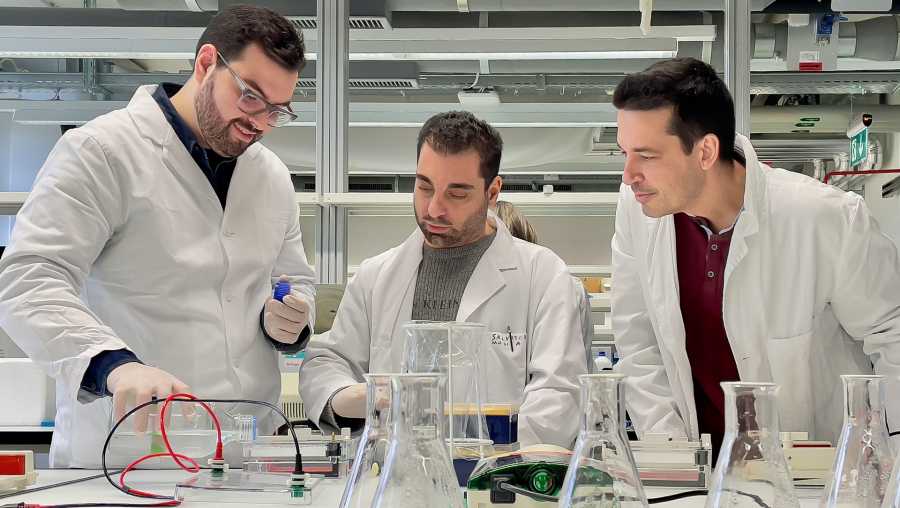Discover your benefits
Why this programme?
The MAS ETH in digital Clinical Research will enable you to pursue patient-centred clinical research to your fullest potential by utilising the power of novel digital technology.
Eva Hefti | Student in the MAS ETH in digital Clinical Research
Andres Affentranger | Resident of Urology, Luzerner Kantonsspital
Why at ETH?
ETH is one of the world's best universities and the best university in continental Europe (Times Higher Education ranking). Become part of it and get access to world-leading experts in digital medicine, sensor technology, software development, artificial intelligence and digital clinical trials. Through direct interaction with these specialists, participants gain first-hand knowledge about these fields. After completing the course, they will continue to benefit from this access in their clinical research projects.
A lifetime connection with ETH
After having graduated with a Master of Advanced Studies (MAS) from ETH you can join the ETH Alumni Association. Stay connected and become inspired! As an ETH alumnus, you will also enjoy various member benefits.
Structure MAS ETH in digital Clinical Research
Great flexibility for participants
The MAS programme, comprising 60 ECTS, is completed part-time over two to three years. The maximum study duration is four years. The MAS programme has a modular structure comprising two mandatory modules and one of several elective CAS modules.
The mandatory modules are:
At present, students can choose between the following six CAS programmes as their elective module:
- CAS ETH in Nutrition in Medicine
- CAS ETH in Regulatory Thinking
- CAS ETH in Applied Statistics
- CAS ETH in Technology and Public Policy: Policy Process
- CAS ETH in Technology and Public Policy: Impact Analysis
- CAS ETH in Entrepreneurial Leadership in Technology Ventures
In addition, the MAS programme also offers a voluntary ETH short course Essential Statistics for Medicine I and will offer pre-courses in Good Clinical Practice soon.
The MAS ETH in digital Clinical Research programme also involves writing a Master's thesis.
At the end of the MAS programme, participants will be able to use digital tools and new study concepts independently and responsibly to conduct pragmatic and patient-centric clinical research.
While the various CAS modules complement one another, the order of attendance does not matter.


“With one exceptionally good study, you can change not only medical treatment but also the lives of many patients. However, absolute professionalism is required to achieve this. There is no room for error or uncertainty. We will teach you not only the essentials but also tips and tricks for carrying out studies.”Dr Sabine Goldhahn, Programme Manager
Key elements of the programme
Teaching philosophy
All the components of the MAS ETH diCR share a common teaching philosophy. Participants learn the principles of digital clinical research while working on their individual research questions. Topics are introduced via remote input presentations, completed by blended learning, and followed up on in hands-on sessions. Finally, participants apply the knowledge gained to the investigation of their individual clinical or health-science-related research question.
Learning objectives
- To understand and apply all aspects of clinical research methodology, e.g. master protocols and decentralised clinical trials
- To understand the concepts of patient centricity and how to apply them in clinical research
- To understand the potential of novel digital technologies (e.g., digital biomarkers, AI, real-world data, remote patient monitoring, digital twins, omics) to improve clinical research
- To understand the key concepts of digital health interventions
- To understand the ethical and regulatory environment in clinical research that applies digital technologies
- To create a novel clinical research study that utilises digital technology

The mandatory CAS ETH in Digital Clinical Trials covers the areas of pragmatic trial planning, modern trial designs, patient centricity, real-world evidence, AI including data safety and ethical aspects, precision medicine, the use of digital biomarkers to enhance data quantity and quality, the validation and use of new digital endpoints in clinical trials, remote patient monitoring, and value-based healthcare.

The mandatory CAS ETH HSG UZH in Digital Health: Therapeutics covers digital health, digital health interventions, designing digital biomarkers, and designing a just-in-time adaptive intervention.
The two mandatory CAS are completed by one of several elective CAS depending on the professional interest and direction our participants wish to take. Among these electives is the CAS ETH Nutrition in Medicine, which covers personalised nutrition, digital nutrition monitoring, nutrition for disease prevention, endocrinology, diabetology, obesity, healthy nutrition in old age, nutrigenomics, food intolerances, food-drug interactions, and toxicology.
In another elective, the CAS ETH in Regulatory Thinking, participants gain insight into the regulatory world and learn about regulatory thinking, intended use, preclinical and clinical requirements, good manufacturing practice, approval processes, post-market activities and how to critically analyse different pathways. If participants want to know how to systematically analyse, design and manage policy-making processes, or how to assess the excpected and actual impact of policy designs, they can choose one of two CAS ETH in Technology and Public Policy.
Participants with entrepreneurial aspirations will profit from choosing the CAS ETH in Entrepreneurial Leadership in Technology Ventures as their elective. And participants who want to analyse data and understand statistical relationships in detail will find their place in the CAS ETH in Applied Statistics.


Get in touch and book your personal consultation on the MAS ETH in digital Clinical Research
Professur Translationale Ern.biol.
Schorenstrasse 16
8603
Schwerzenbach
Switzerland



